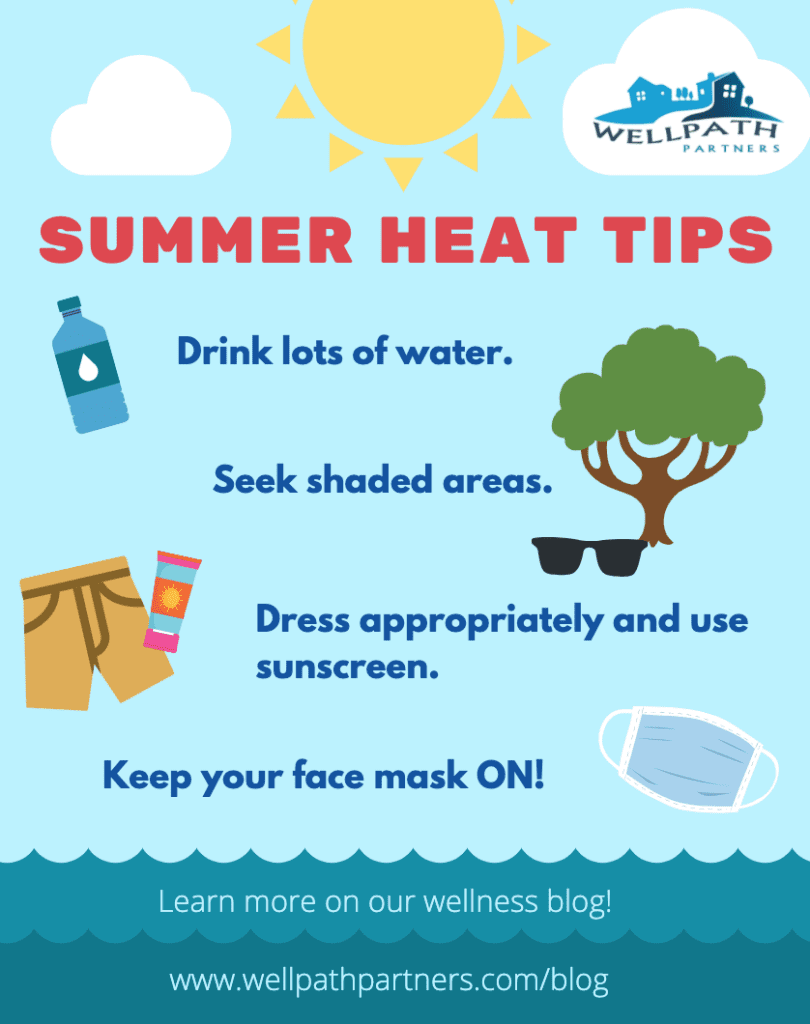
Hot weather can be more than just uncomfortable. It can be dangerous to one’s physical and mental health! Older adults especially are at an increased risk of sunburn, heat stroke, and heat exhaustion. A recent study conducted by the University of Chicago Medical Center revealed that 40% of heat-related fatalities in the U.S. were among people over the age of 65.
There are many effects of aging on the body that make seniors more vulnerable to heat injuries. Less skin elasticity can make older adults more susceptible to getting sunburn from over exposure to harsh sunlight. Aging can also lower one’s stamina making them more prone to heat exhaustion or heat stroke. This can be exacerbated for women during menopause due to hot flashes which can turn unbearable in already warm climates. Fortunately, a few simple precautions are all that is needed to keep cool and safe. Here are a few tips:
1. Drink Plenty of Water
Dehydration is the root of many heat related health problems. Drinking water even when not thirsty is a great precaution to pr while outside. Remember to avoid alcoholic or caffeinated drinks, as they can contribute to dehydration.
2. Dress Appropriately
An old Swedish proverb says, “There’s no such thing as bad weather, only bad clothes.” Light-colored, lightweight, loose-fitting clothes and a wide-brimmed hat are ideal when going out on a hot day.
3. Stay Indoors During Midday Hours
Midday hours from 10 am to 3 pm are the hottest times of the day and when the sun’s UV rays are the strongest. The best time to run errands or be outdoors is before 10 am or after 6 pm, when the temperature tends to be cooler and there is less sun to cause damage on the skin.
4. Take it Easy
When it is too hot outside, try and relax indoors with a good book or movie. Especially avoid exercise, outdoor errands, and strenuous activity.
5. Watch the Heat Index
People’s ability to notice changes in their body temperature decreases with age. When there’s a lot of moisture in the air (high humidity), the body’s ability to cool itself through sweating is impaired. The heat index factors both humidity and temperature to approximate how the weather really feels. The current heat index temperature is generally the one reported on local TV broadcasts and popular weather apps.
6. Seek Air-conditioned Environments
If one’s home does not have air-conditioning, seniors should consider finding an air-conditioned place to spend time during extreme heat. Malls, libraries, or movie theaters are all great options to hide from the heat. If other locations are not an option for some seniors, taking a cool bath or shower can also help regulate body temperature. Shutting the blinds or curtains in your home can also be a great way to keep out sunlight and heat.
7. Know the Warning Signs of Heat-related Illness
Dizziness, nausea, headache, rapid heartbeat, chest pain, fainting and difficulty breathing are all warning signs that help should be sought immediately.
If you or an aging loved one struggles to maintain these steps for heat safety, this summer may be a good time to consider assisted living facilities for extra help. WellPath Partners has a vast network of assisted living communities and our friendly resources partners are available to help find the best senior living facility tailored to your personal needs.
WellPath Partners is your senior resource referral guide. Follow us on ALL social media platforms and join us weekly for more content and public health discussions.
By: Prithvi Chauhan
BA Business Marketing, Portland State University
